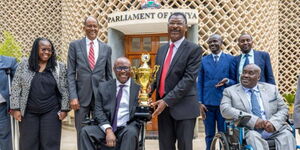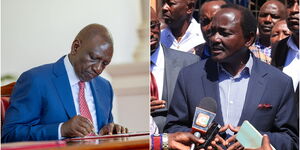A Kenyan has filed a petition with the Law Society of Kenya seeking to have Deputy President Kithure Kindiki and Interior Cabinet Secretary Kipchumba Murkomen, who are both advocates, struck off the advocates’ roll.
In his petition, the lawyer, Kepha Ojijo, argued that the two had violated the Constitution of Kenya as well as the oaths of office they swore to uphold and protect human rights and constitutional principles.
He also accused both leaders of overseeing excessive brutality against citizens in the course of their duties as public officers, referencing police excesses that have characterised their respective tenures as Interior Cabinet Secretaries.
Additionally, the lawyer maintained that extrajudicial killings and forced disappearances warranted the filing of the petition to remove the two from the list of practising advocates.
Further, he stated that the two leaders had not shown any remorse regarding the accusations levelled against them.
The LSK has recently come under intense public pressure over its perceived silence and inaction on the conduct of the two, whose stints at the helm of Kenya's security docket have been marred by repeated allegations of human rights abuses, including abductions allegedly carried out by state agents.
On Monday, former LSK President Nelson Havi raised concerns over the inaction on the two, warning that it risked spoiling the reputation of the society.
"The Law Society of Kenya ought to have taken action against CS Murkomen by now, and the justification for that action is the number of people who have been shot in police stations, a confirmation that there are indeed officers complying with unlawful and unconstitutional orders issued by Murkomen," Havi stated.
Under Kenyan law, advocates can be struck off the Roll of Advocates if found guilty of professional misconduct, criminal offences involving moral turpitude, or conduct that brings the legal profession into disrepute.
This process is guided by the Advocates Act (Cap 16), which empowers the Advocates Disciplinary Tribunal (ADT), formerly known as the Disciplinary Committee, to investigate and discipline lawyers. Any person or body, including the LSK, may lodge a complaint that could trigger such disciplinary proceedings.
If the ADT finds sufficient evidence against an advocate, it may recommend removal from the Roll, suspension from practice, or imposition of fines and other sanctions. The decision must follow due process—allowing the advocate to respond to the allegations—and is subject to appeal at the High Court. Striking off is considered the most severe punishment and is typically reserved for serious breaches of professional ethics or the law.
According to Section 62 of the Advocates Act, an advocate who is struck off cannot practice law unless reinstated, which can only be considered after at least five years. The individual must demonstrate full rehabilitation, good conduct, and continued respect for the profession and the law.
In the case of DP Kindiki and Interior CS Murkomen, the LSK’s petition argues that their conduct in public office—including alleged human rights abuses and disregard for constitutional values—meets the threshold for disciplinary action and potentially warrants striking off.












